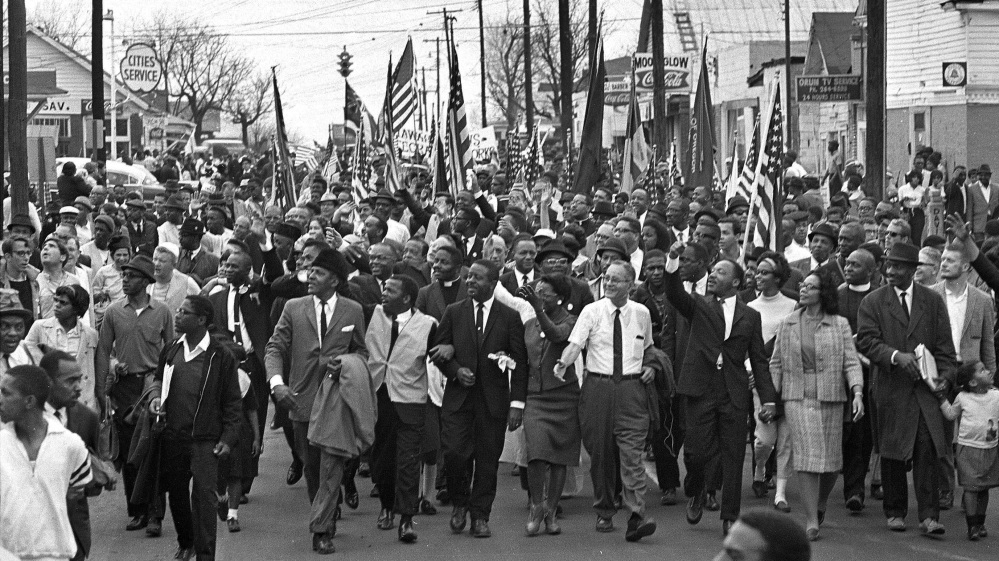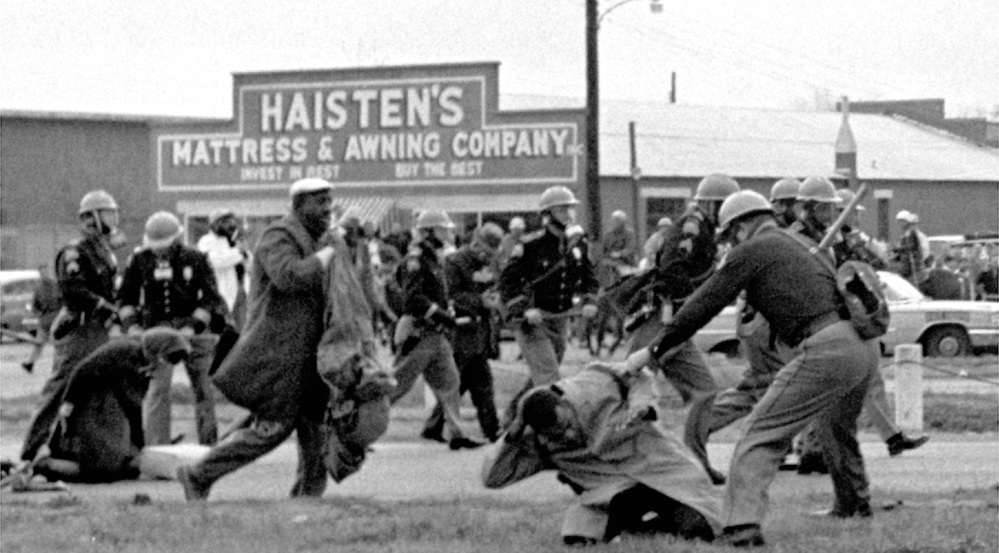SELMA, Ala. — In just a few days, the small city where Kimbrough Ballard has lived for most of his adult life would be deluged with politicians, celebrities and tens of thousands of civil rights pilgrims.
“The whole world is going to be watching us,” said Ballard, who serves as the elected head of the county government here.
President Obama and former President George W. Bush will be at the famous Edmund Pettus Bridge. There were rumors that Oprah Winfrey will show up, and even that Lady Gaga will sing.
They are coming to rekindle the spirit of a city where, 50 years earlier, nonviolent demonstrators endured billy clubs, cattle prods and clouds of tear gas as they protested for their right to vote. Selma’s “Bloody Sunday,” a day of shocking violence and stirring courage, spurred passage of the Voting Rights Act, one of the most important achievements of the civil rights era.
“What happened in Selma is quintessentially an American experience,” Obama said last week at the White House.
“The civil rights movement . . . at its best” is how Rep. John Lewis, D-Ga., whose head was cracked open by state troopers on the bridge that day, describes it now.
On Tuesday morning, though, the celebration hadn’t begun; the celebrities hadn’t started to arrive. Selma wasn’t so much a place of imagination and triumph as a poor Alabama city where more than 40 percent of the population lives in poverty and the unemployment rate is twice the state average. It was a place still struggling to overcome the racial divisions that have in many ways defined it for generations.
Ballard, 71, headed off to his pickup truck for his first big event of the day: a ribbon cutting at the local Sonic restaurant. In the past few months, Selma has lost two department stores: J.C. Penney and Goody’s. The restaurant event offered a rare bit of good economic news.
“Technically it’s more of a reopening than an opening,” Ballard said. “The place looked terrible. Thank God Sonic saw fit to invest thousands of dollars in it instead of picking up and leaving.”
Today, almost all of the top elected officials in Selma and surrounding Dallas County are black. Ballard, who is white, stood next to Mayor George Evans, who was elected in 2008 as the second black mayor in Selma’s history. Also in the ribbon-cutting line was Benny Lee Tucker, a city councilman and one of the heroes of the Bloody Sunday march.
“He was a true foot soldier,” Ballard said of Tucker. “A bodyguard for Martin Luther King. A lot of people say they were there. He really was.”
“What was that like?” the Sonic executive asked.
“It was dangerous,” said Tucker, 74. “They told me to throw my body over King if anyone took a shot at him.”
A Sonic waitress glided by on roller skates. Tucker walked to his car and returned a few seconds later with a manila envelope containing copies of an interview he did with a German newspaper and photocopied pictures of him standing watch over King as the civil rights icon knelt in prayer on a Selma sidewalk.
“Thanks for what you did,” the Sonic executive said. Tucker slid his papers carefully back in the envelope.
“Thank you for what you’re doing for Selma today,” Ballard added, gesturing to the restaurant.
For Obama, the trip to Selma on Saturday is a chance to tap into a place where the civil rights movement reached its apex. In the days after Bloody Sunday, more than 30,000 protesters from across the country – college students, pastors, businessmen and homemakers –converged on Selma. “It reminds us that the history of America doesn’t belong to one group or another,” Obama said recently. “It belongs to us all.”
The president will be making the trip with his wife and daughters. There will also be at least 95 members of Congress in attendance – Republicans and Democrats.
Obama recently met with some of the activists who were part of the voting rights battles in Selma in the 1960s. His message to them was that his presidency was their legacy.
“I wouldn’t be where I am if it was not for you,” he told them, according to senior White House adviser Valerie Jarrett.
Aides said the president has been writing portions of his Saturday speech himself. One of his goals is to link the spirit of the 1960s Selma protests to today’s battles over issues such as gay marriage, income inequality and immigration.
For the past five decades, Bloody Sunday has been as much burden as blessing to Selma. Now Ballard and other elected officials are hoping that the world’s attention might provide their town with a much-needed jolt.
The brutal, institutionalized racism that outraged much of the country is gone from Selma, replaced with murkier problems that cannot be repaired by a brave stand on a bridge or a sweeping piece of legislation.
More than anything, Evans said, Selma needed more skilled workers. “We have the jobs,” he said, “but we don’t have the skill sets to man the jobs.”
The interview finished and Ballard headed back to his office in the county courthouse. He had arrived in Selma from neighboring Marengo County in 1967 to sell life, health and burial insurance door-to-door, mostly to black families. His slogan was, “We insure from the womb to the tomb.”
“There was still a lot of tension, but I was too naive or too young to be worried much about it,” he said.
Eventually, those clients became his supporters when he ran for city and county office. In the past few years, as his tax base has dwindled, Ballard has cut his county maintenance staff from seven people to two, slashed the number of county cellphones and postponed road repairs to balance his budget.
“We got a black eye in 1965, and that followed us,” he said. But Bloody Sunday has also brought some benefit to Selma, Ballard said.
The flood of visitors to see a sitting president and pay homage to a moment when right triumphed over wrong would probably add up to one of his best months for sales tax receipts in decades. “These days, I live and die by that revenue,” he said.
Copy the Story LinkSend questions/comments to the editors.




Success. Please wait for the page to reload. If the page does not reload within 5 seconds, please refresh the page.
Enter your email and password to access comments.
Hi, to comment on stories you must . This profile is in addition to your subscription and website login.
Already have a commenting profile? .
Invalid username/password.
Please check your email to confirm and complete your registration.
Only subscribers are eligible to post comments. Please subscribe or login first for digital access. Here’s why.
Use the form below to reset your password. When you've submitted your account email, we will send an email with a reset code.